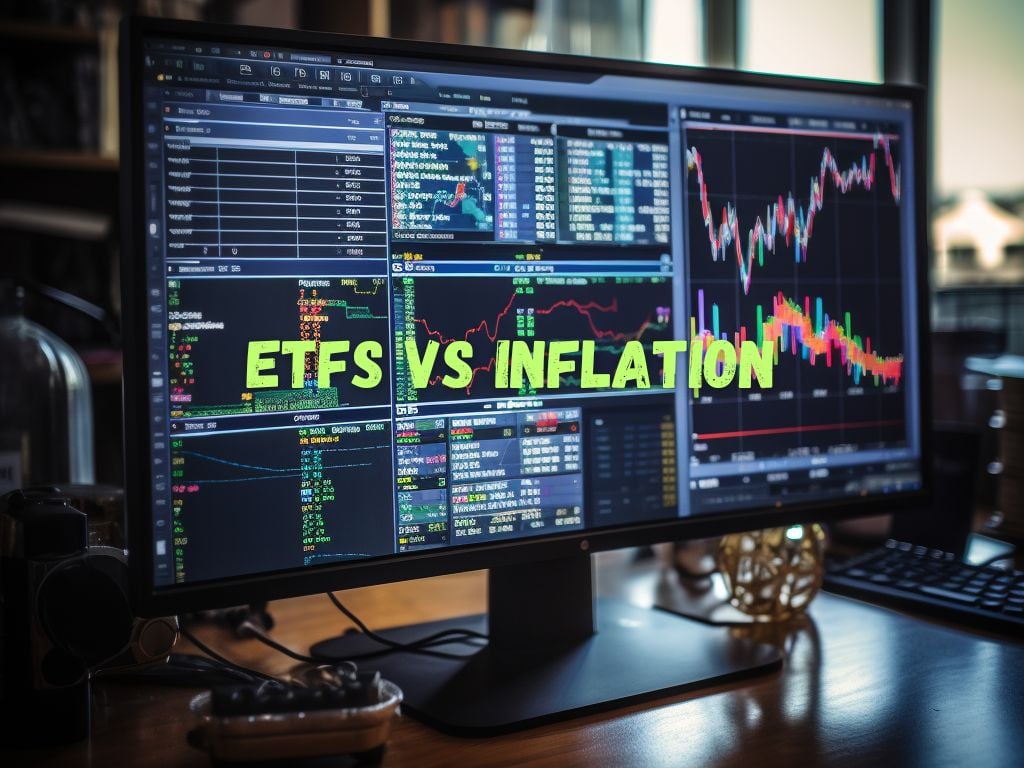Inflation can be a major deterrent for investors, as it erodes the purchasing power of their money.
The value of money declines as prices increase over time, causing a decrease in real returns.
In this article we will discuss ETFs vs inflation. Because, we believe that one way to protect your investments against inflation is to invest in Exchange Traded Funds (ETFs).
ETFs are known for their diversified portfolio, liquidity, and low costs.
In this article, we’ll explore the reasons why ETFs are the best bet against inflation and how investors can benefit from their structure.
Why ETFs are a Hedge Against Inflation:
ETFs are a diversified investment option that provides exposure to a variety of asset classes.
When inflation occurs, it impacts different sectors of the economy unevenly.
However, ETFs provide ample diversification by investing in multiple asset classes, providing insulation to your portfolio against the negative impact of inflation.
Moreover, ETFs that track inflation-protected bonds (TIPS) can be used as a hedge against inflation.
TIPS are securities that adjust their value in response to changes in inflation and provide investors with a means of combating inflation.
The objective of a TIPS ETF is to mimic the performance of TIPS and provide investors with a means of participating in their growth.

ETFs vs Inflation: Key Strategies for Investing in ETFs during Inflation:
While investors can enjoy the benefits of ETFs during inflation, there are key strategies to consider when investing in them. The first is to focus on inflation-protected ETFs.
Investing in an ETF that tracks TIPS can be an effective way to mitigate the impact of inflation. These types of ETFs are also referred to as inflation-indexed bonds.
The interest paid on these bonds adjusts with inflation, resulting in better returns for investors during an inflationary period.
Investors should also allocate funds to sectors that perform well during inflationary periods.
Traditionally, sectors such as consumer staples, healthcare, and utilities have remained stable and performed relatively well during such periods. These sectors are known for their steady income flows despite economic recessions.
Finally, investors should emphasize the importance of investing in dividend-paying ETFs, as it ensures that returns are not eroded by inflation.
Dividend-paying ETFs offer a stable income flow that helps buffer the impact of inflation on returns.
They typically invest in companies that pay consistent dividends, typically in sectors such as real estate, utilities, and telecommunications.
Top ETFs to Consider for Inflation Protection:
Here we highlight the best etf for inflation to consider for inflation protection.
The iShares TIPS Bond ETF (TIP) is an excellent option for investors who want to invest in inflation-protected bonds.
The ETF tracks the performance of the Barclays U.S. Treasury Inflation Protected Securities (TIPS) Index.
It invests in a diversified portfolio of TIPS with maturities that range from one year to 30 years. TIP is, therefore, an excellent choice for investors seeking a low-cost investment vehicle that is also easy to trade.
Invesco S&P 500 Low Volatility ETF (SPLV)
The Invesco S&P 500 Low Volatility ETF (SPLV) may not directly track inflation, but it invests in low-volatility stocks that perform well during inflationary periods.
The ETF invests in 100 of the S&P 500’s least volatile stocks and adjusts its holdings quarterly based on the latest volatility measurements.
This ETF is less volatile than the broader market and is an excellent choice for investors who want exposure to the market while reducing investment risk.
Schwab U.S. Dividend Equity ETF (SCHD)
The Schwab U.S. Dividend Equity ETF (SCHD) is a great dividend-paying ETF option. The ETF tracks the performance of the Dow Jones U.S.
Dividend 100 Index, which is made up of 100 high-quality companies that pay consistent dividends.
The ETF is made up of companies in defensive sectors, including consumer staples, healthcare, and utilities, which tend to outperform during inflationary periods.
Schwab U.S. TIPS ETF (SCHP)
The Schwab U.S. TIPS ETF (SCHP) is another excellent option for investing in TIPS.
The ETF tracks the performance of the Bloomberg Barclays U.S. Treasury Inflation-Protected Securities (TIPS) Index.
The ETF invests in a diversified portfolio of TIPS with a variety of maturities. The ETF is an excellent choice for investors who want exposure to a diversified portfolio of inflation-protected securities.

Risks and Considerations:
Investing in ETFs during inflationary periods is not risk-free. Inflation-protected investments can be more expensive than traditional fixed-income investments.
Furthermore, inflation can be unpredictable.
During an inflationary period, interest rates may increase rapidly, resulting in a decrease in bond prices, and hence, a reduction in portfolio value. Investors must do proper research and understand the investment strategies and risks associated with each ETF they intend to invest in.
Frequently Asked Questions:
Q: How do ETFs protect against inflation?
A: ETFs invest in a wide range of assets that can provide investors with insulation against inflation. Some ETFs invest in sectors that perform well during inflationary periods, while others invest in inflation-indexed bonds that are designed to rise with inflation.
Q: What are the best ETFs for inflation hedge?
A: The best ETFs to hedge against inflation include ETFs that track inflation-protected bonds (TIPS), low-volatility ETFs, and dividend-paying ETFs.
Conclusion:
ETFs are a great investment option for investors who want a diversified and low-cost investment vehicle to hedge against inflation.
Investing in ETFs that track TIPS, allocate funds to sectors that perform well during inflationary periods, and emphasize dividend-paying stocks can help investors combat inflation.
However, before investing in ETFs, investors must understand the risks and strategies associated with each.
Thus, with proper research and selecting the proper ETFs, investors can use ETFs effectively as a hedge against inflation.


 Tags:
Tags:










